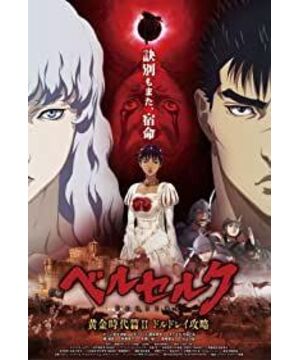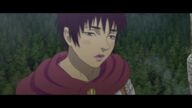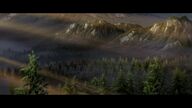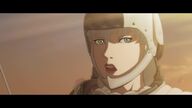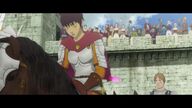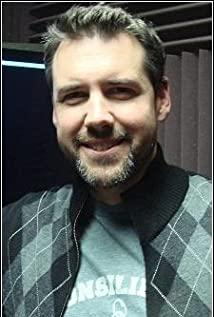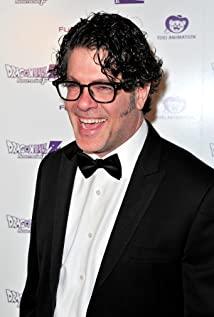+++++++++++++++++++++++++There are spoilers, there are spoilers, there are spoilers, there are spoilers++++++++++ ++++++++++
First of all, the description of the group portraits has been significantly improved. Compared to the first film, this is the biggest improvement, and there is a feeling that the supervisor has finally mastered a reasonable film language to tell the story. In addition to taking into account the image of the Eagles, especially the image of Casgar, the relationship between Gus and Griffith was put at the core. As for some of Griffith's past adultery, including Casgar's past, he also avoided large paragraphs of text and brought them through in different ways. The contradictions of the plot are very concentrated, which is a very correct strategy. The occasional gags and the depiction of battlefield performances by other captains of the Eagle Corps are well woven into the protagonist line, all of which are extra points. It can be said that the few dialogues and scenes of these characters are used on the edge. The effect can be seen especially in the part of the farewell in the snow. You can see that other people are begging Gus to stay, expressing understanding and respect, or yelling and swearing, each of which shows the cultivation on the battlefield The feelings for Gus that arise, everyone's views on Gus are different. But at this time, the silent Griffith was highlighted, and everyone took it for granted that they understood how much Griffith valued Gus, but in fact they didn't. Everyone can express their feelings for Gus, but not Griffith. To Gus, Griffith is special, and to Griffith, Gus is not only special, but also an unspeakable necessity. The protagonist was immediately highlighted by the group portrait. At this time, the audience saw that Gus, who had always thought he was alone, was not alone, but Griffith, who had always attracted this other person to be surrounded by admirers, was the loneliest - watching other people chatting around Gus, he was not at all lonely. out of complete condition. Not to mention that this is the original film, at least the choreography effect is not inferior to the original, this scene is still very exciting.
Second, abridgement is unavoidable, but reasonable. Compared with the original work, both the first and second theatrical versions have deleted some of Griffith's inner activities and confessions, as well as the more exaggerated interaction of the Eagles in the original work. Maybe this caused some resentment from the original party. In the first part, it made Griffith's obsession with Gus seem "love at first sight", and how Gus accepts being driven by Griffith is also sloppy, I think points are deducted. But in the second part, the interaction of the Eagle Corps was deleted, which has little effect on the smoothness of the plot; and the deletion of Griffith's inner drama, I think this is a successful decision. In this film, Griffith's inner activities only appeared in the snow duel and the temptation of the princess. Compared with the original Clam's carefully designed duel moves, and the situation where he knew he might kill Gus Xia still "would rather kill him than let him go", the clams in the film seem to be less calculated, more flustered and impulsive - that is to say, the film that reduces the confession makes the characters more frank. It also makes this part of the clam in the movie adaptation more sympathetic than the one in the comics. In the comics, the clam's self-destruction and the tragic character are stronger (even if I am a rotten girl, I still have a sense of sanity, and I feel that the excessive possessiveness depicted in the comics is cute, but it is also too radical); and here is more The feeling of being hit in the head, at the same time, his fall is even more regrettable and worthless. The same is true for the part of seducing the princess. Clam is not as articulate as in the comics, and seems to maintain a perfect mask on the surface. In the movie, he is more lost and uncontrollable, and his attitude towards the princess is more cruel and abusive. The cruelty of the passions that make people and dangerous people feel stronger.
Third, the fates of the two characters in the second part are intertwined and become a main line, which is the clue that the legend of Jianfeng runs through. But this is not achieved by having the protagonists communicate with each other. Casgar lit up. She and Gus were slowly getting closer. Her firmness with the Clams and Eagles was a driving force behind Gus' exodus. Gus felt that everyone in the Eagle Corps had their own dreams, no confusion, no wavering; this made him envious. Gus's psychological activities repeatedly showed the clam's "peer-to-peer friend" speech and self-questioning. Although the bonfire conversation and other content were removed, Gus's departure from the Eagles was a foreshadowing and a natural progression. Leaving immediately after the dance intensified the contrast. The prosperity of the triumph and the silence of Gus who distanced himself from the clams, the dizzy dance party with the whole tone like champagne also formed a strong contrast with Gus standing alone by the door. It reinforces his sense of alienation from clam-style success. Before, Griffith had been calm like the sea without storms, Gus was confused and manic (the madness was filmed in the part of the slash of a hundred people, this scene can definitely arouse the mood of the comic party, because madness is the keynote of Gus's life after that, This scene was very well shot!). When it came to a duel in the snow, the situation was completely reversed: Gus was as stable as a mountain and had the wind of a general, but Griffith was confused and manic. The tone of Fith's life - win or be destroyed, isn't this the trajectory of the Eagles and Griffith? The sense of destiny is expressed, and I feel that I have really entered the world of Jianfeng - all appearances are shattered, all positions are reversed, the savior has become the source of disaster, what binds others is actually bound, etc...
In short, As the highlight of the eclipse too much, I think this one surpasses the first two stars. Finally got the angle of adaptation, looking forward to the third part. Of course, there are also some flaws. What made me laugh was the excessive rippling reaction of the princess when she was touched. Hey, that expression is like a clam turning into a massage stick!
View more about Berserk: The Golden Age Arc II - The Battle for Doldrey reviews


